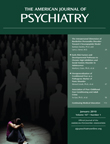To the Editor: In the August 2009 issue of the Journal, Falk Leichsenring, D.Sc., et al. (1) presented findings from a randomized, controlled trial comparing short-term psychodynamic psychotherapy and cognitive-behavioral therapy (CBT) in patients with generalized anxiety disorder. We are pleased to see a trial assessing the efficacy of short-term psychodynamic psychotherapy, a form of psychotherapy that has not been adequately studied in the treatment of anxiety disorders. However, despite the importance of the questions addressed in this study, there is a serious methodological concern that limits the conclusions that can be drawn.
The issue is the primary outcome measure. In randomized, controlled trials, the primary outcome measure is the principal indicator by which the efficacy of an intervention is evaluated. It measures the outcome of greatest importance in a trial. The principal indicator of treatment efficacy in this study was the Hamilton Anxiety Rating Scale (HAM-A), a clinician-administered scale that assesses the severity of 14 broad categories of symptoms, presumed to be associated with anxiety. HAM-A has been used as an outcome measure in numerous generalized anxiety disorder treatment studies and has long been the standard primary outcome measure in pharmacological randomized, controlled trials.
At one time, when generalized anxiety disorder was a nonspecific disorder characterized by diffuse anxiety symptoms, the use of HAM-A was appropriate. However, with the introduction of DSM-III-R in 1987, generalized anxiety disorder became a disorder of worry. The central symptom of DSM-IV-TR-defined generalized anxiety disorder is excessive and uncontrollable worry. HAM-A does not adequately measure the central symptom of DSM-IV-TR generalized anxiety disorder (2). Furthermore, most of the symptoms assessed by HAM-A (e.g., cardiovascular, respiratory, and gastrointestinal symptoms) are not among the DSM-IV-TR-associated symptoms of generalized anxiety disorder. HAM-A has been in existence for one-half century and remains a popular instrument for assessing anxiety despite these limitations. However, the scale is poor at discriminating between generalized anxiety disorder and depression (3), and there are several newer measures that are more appropriate for assessing generalized anxiety disorder symptoms and worry in particular. Of note, in the randomized, controlled trial conducted by Leichsenring et al., short-term psychodynamic psychotherapy and CBT led to comparable decreases in HAM-A scores. However, CBT was superior to short-term psychodynamic psychotherapy in the secondary outcome measure, which was the Penn State Worry Questionnaire, a well-established measure of excessive and uncontrollable worry.
HAM-A is problematic for a second reason: it is clinician administered. HAM-A may be vulnerable to allegiance effects and other related factors that can influence the way questions are posed and the way responses are scored by the clinician, even if methods are put into place to limit potential interviewer biases. For this reason, it is important to assess primary outcomes using a combination of clinician-administered and self-report measures.
In our opinion, the results of the randomized, controlled trial conducted by Leichsenring et al. are equivocal, largely as the result of the selection of a primary outcome measure that is an unsuitable measure of the central feature of DSM-IV-TR-defined generalized anxiety disorder.

